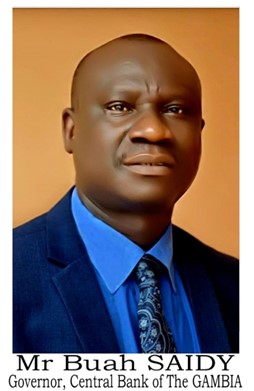By Kebba Ansu Manneh
Central Bank of The Gambia (CBG) has denied and dismissed corruption allegations in the foreign currency market and described the allegations as false and a smear campaign made to tarnish the image of the Bankers Bank.
Last week, an online newspaper, The Alkamba Times, made startling revelations alleging that Central Bank Governor Buah Saidy and top officials at the Presidency have been “colluding” in the supply of foreign currency to the local exchange bureaus.
The medium also reported the names of individuals and foreign exchange bureaus that the CBG reportedly deals with including JV Trading, George Banna, Shyben Madi, Gam Food Trading Company, Sud FM Shop, Cendual Enterprise, and Futanka Enterprise, alleging that each of these entities received up to $3M at a time in hard currency leading to the continuous depreciation of the dalasi.
However, officials of the Bankers Bank have refuted such allegations in its weekly radio programme on West Coast Radio, where they said the depreciation of the dalasi is linked to a series of factors including the decline in cross-border Cashew trading, the embargo on timber trading as well as the Ukraine-Russia war that affected the flow of foreign exchange in the financial market.
“We are very saddened to receive information peddling around town that the Central Bank of The Gambia has been giving out foreign currencies to business entities who are not using the monies for the purpose it was given out for.
“This far from the truth and far from the truth, the journalist(s) who wrote this story did not confirm his story from officials of CBG to verify his story before writing the article,” said Karafa Jobarteh, Director of Financial Markets CBG refuted corruption allegations.”
He added: “Central Bank of The Gambia is owned by the country and belongs to all Gambians and therefore any smear campaign against Bank is against all Gambians.
” If the Bank’s image is tainted negatively before the world if it has a problem it will affect everyone in the country, therefore we are appealing to all journalists who need information from CBG to come forward and approach the relevant authorities and get the right information before engaging in a smear campaign.”
The Director of Financial Markets disclosed that the main sources of foreign currency to the country from April to September have been the foreign currency accrued from cashew trading and timber trading, arguing that these sectors have been affected by the various embargoes on these businesses that are no more bringing foreign currency into the country.
He went further to disclose that the Ukraine-Russia war has affected trade worldwide and the Central Bank of The Gambia is no exception, hinting that this situation leads to constraints for businesses in need of dollars to be able to import into the country.
Karafa Jobarteh explained that the cashew trading between Gambia, Senegal, and Guinea Bissau has been contributing significantly to the availability of foreign exchange in the market, adding that due to trade policies implore by Senegal and Guinea Bissau this foreign exchange accrued from this business is no more coming.
He added that timber trading which usually brings in foreign currency to the country from April to September has also not been forthcoming, disclosing that this two-sector alone usually injects more than D120 million into the economy making matters complicated in the foreign exchange market.
CBG Director of Financial Markets continued that this year, the Central Bank of The Gambia was able to inject D87 million Dalasi into the financial markets to support businesses in the country, noting that this money was evenly distributed to all twelve (12) commercial banks spreading in the country with the view to make available foreign currencies to these businesses in need of the currencies in doing their tradings.
He disclosed that some state-owned enterprises such as NAWEC, GNPC, and other business entities that are into importing foodstuffs into the country also benefited from this supply. He added that in July of this year Central Bank of The Gambia also intevened and help some companies to be able to clear their goods at the seaport view to stabilise the availability of foodstuffs in the country.
He finally called on the press to always verify their sources from relevant authorities of the bank before running their publications, adding that CBG has an open-door policy that journalists can channel their queries through to confirm their sources for the interest of the country.





